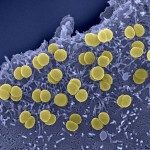Link to Pubmed [PMID] – 26241037
Link to DOI – 10.1371/journal.ppat.1005078
PLoS Pathog 2015 Aug; 11(8): e1005078
Differential modulation of NF-κB during meningococcal infection is critical in innate immune response to meningococcal disease. Non-invasive isolates of Neisseria meningitidis provoke a sustained NF-κB activation in epithelial cells. However, the hyperinvasive isolates of the ST-11 clonal complex (ST-11) only induce an early NF-κB activation followed by a sustained activation of JNK and apoptosis. We show that this temporal activation of NF-κB was caused by specific cleavage at the C-terminal region of NF-κB p65/RelA component within the nucleus of infected cells. This cleavage was mediated by the secreted 150 kDa meningococcal ST-11 IgA protease carrying nuclear localisation signals (NLS) in its α-peptide moiety that allowed efficient intra-nuclear transport. In a collection of non-ST-11 healthy carriage isolates lacking NLS in the α-peptide, secreted IgA protease was devoid of intra-nuclear transport. This part of iga polymorphism allows non-invasive isolates lacking NLS, unlike hyperinvasive ST-11 isolates of N. meningitides habouring NLS in their α-peptide, to be carried asymptomatically in the human nasopharynx through selective eradication of their ability to induce apoptosis in infected epithelial cells.

